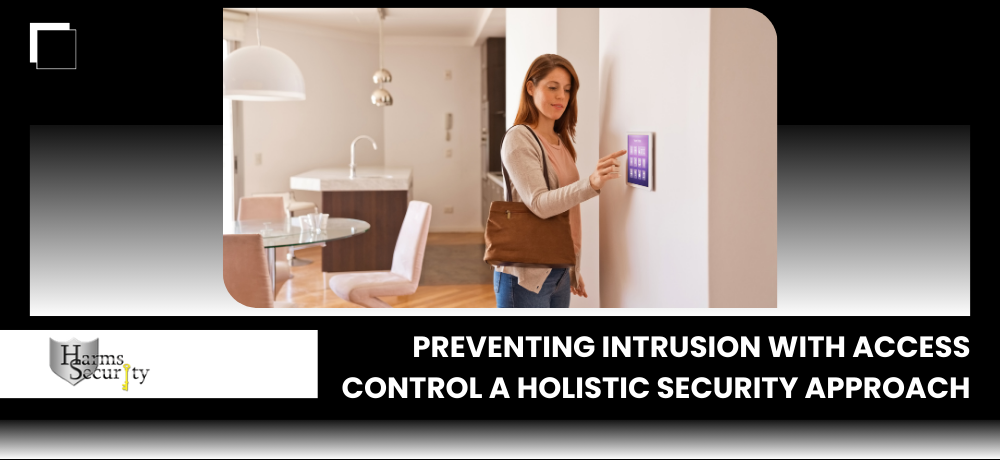Preventing Intrusion with Access Control A Holistic Security Approach

In an era where security concerns are at the forefront of every business owner's mind, adopting a proactive and comprehensive security strategy is imperative. One pivotal component of such a strategy is access control, an electronic system that goes beyond traditional lock and key methods to manage and restrict entry to specific areas. This blog will delve into the importance of access control in preventing intrusions, exploring its various aspects and highlighting its role in creating a robust and holistic security framework.
Understanding Access Control
Defining Access Control in Commercial Settings
Access control is a sophisticated electronic system designed to authenticate and authorize individuals based on predetermined criteria. Unlike traditional methods, such as lock and key, access control utilizes advanced technologies like key cards, PIN codes, and biometrics to regulate entry, monitor access points, and provide a detailed audit trail of personnel movements within a facility.
Commercial Access Control
In a commercial setting, access control systems play a crucial role in bolstering security. These systems employ electronic solutions to regulate entry, offering businesses a higher level of control over who can access specific areas and when.
Authentication Mechanisms
Access control relies on various authentication mechanisms to verify the identity of individuals seeking entry. Whether through key cards, PIN codes, or biometrics like fingerprint or retina scans, these methods ensure that only authorized personnel can access designated areas.
Audit Trails and Monitoring
A key feature of access control is its ability to generate detailed audit trails and monitor access events. This not only aids in investigations following security incidents but also acts as a deterrent, as individuals are aware that their movements are actively tracked.
The Role of Access Control in Intrusion Prevention
Enhancing Physical Security
One of the primary functions of access control is to prevent physical intrusion into business premises. By restricting access to sensitive areas, businesses can significantly reduce the risk of unauthorized individuals gaining entry, thereby safeguarding assets, and confidential information, and ensuring the safety of employees.
Securing Restricted Areas
Access control systems enable businesses to designate specific areas as restricted, allowing them to control and monitor who has access to these spaces. This is particularly crucial in industries where confidentiality and data security are paramount.
Deterrence Effect
The presence of access control systems acts as a deterrent to potential intruders. The knowledge that unauthorized access is actively monitored and restricted discourages individuals with malicious intent, contributing to a safer environment.
Emergency Situations
Access control systems are adaptable to emergencies. In the event of a security threat or crisis, access control settings can be quickly modified to restrict access to certain areas, ensuring the safety of individuals within the premises.
Access Control Integration for Comprehensive Security
Achieving Synergy with Surveillance
For a truly comprehensive security approach, it is essential to integrate access control seamlessly with other security systems, with surveillance being a key complementary component. This synergy between access control and surveillance enhances the overall effectiveness of the security infrastructure.
Surveillance and Access Control
Integration with surveillance systems allows for real-time monitoring of access points. This integration provides visual verification of individuals attempting to gain entry, facilitating an immediate response in case of suspicious activities.
Event Correlation
Access control integration with surveillance enables event correlation. In the event of a security breach, the system can automatically trigger surveillance cameras to focus on the affected area, providing valuable visual data for investigations.
Customizing Access Control Solutions
Tailoring Security Measures to Business Needs
One of the strengths of access control lies in its adaptability to diverse business environments. Customization is key, as businesses can tailor access control solutions to align with their specific needs, ensuring a bespoke security strategy.
Scalability
Access control systems should be scalable to accommodate the changing needs of a business. Whether expanding or downsizing, a scalable system ensures that security measures evolve in tandem with the business.
Adapting to Industry Standards
Access control customization allows businesses to adhere to industry-specific security standards and regulations. Tailoring the system ensures that it aligns with the unique requirements of different sectors.
User Management
Customization extends to user management, enabling businesses to define access levels based on roles and responsibilities. This granular control ensures that individuals have the necessary access rights for their specific duties.
Preventing intrusion with access control is a critical aspect of a holistic security approach for businesses. By embracing electronic access control systems, businesses can fortify their premises against unauthorized access and enhance overall security measures. If you are looking for access control, then reach out to Harms Security. From understanding access control and its authentication mechanisms to recognizing its role in preventing physical intrusion, businesses can leverage this technology to create a safer and more secure environment. As a fundamental element of a comprehensive security strategy, access control, when integrated with surveillance and customized to specific business needs, becomes a powerful tool in safeguarding against potential threats.
Get in touch with us today
To learn more about what we do, please click here. To contact us, please click here or call us at (519) 635-8269.